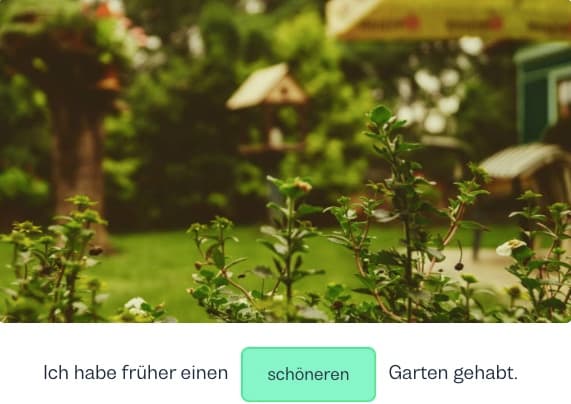I want to learn...
Comparative German adjectives are useful for comparing one person, object or situation to another. Knowing how to use them correctly will allow you to say things like“Munich is more expensive than Berlin”, or that the potato salad in the south of Germany tastes better than the ones in the north (make sure to try both!).
Likewise, if you want to talk about the best restaurant, the highest building or the funniest person, you will need to know the superlative forms.
In this article, you will learn about both comparative and superlative adjectives in German. We will also have a closer look at how they are formed, some irregular adjectives, and how to use them properly.
How to form the Komparativ (comparative adjectives) in German
We’ll start by focusing on the comparative. To form the Komparativ, we have to add the ending -erto an adjective. So klein (small) becomes kleiner (smaller), schlau (clever) becomes schlauer (cleverer), and so on.
| English adjective | German adjective | German comparative |
|---|---|---|
| loud | laut | lauter |
| fast | schnell | schneller |
| beautiful | schön | schöner |
| boring | langweilig | langweiliger |
| tasty | lecker | leckerer |
Unlike in English, where we sometimes use “more + adjective” to make the comparative (for example, “more boring”), in German, you always form the comparative with-er, (e. g. langweiliger) – even if the adjective is quite long! This also happens when we form superlatives in German.
Note: Some comparative forms, such as dunkel → dunkler (dark) and teuer → teurer (expensive) lose an “e” along the way.
How to form the Superlativ (superlative adjectives) in German
To form German superlatives, you usually have to put the word am before the adjective and add -sten to the end of the adjective. Again, and unlike with English superlatives, this rule applies no matter how many syllables the adjective has: Das Buch ist am interessantesten. (The book is the most interesting.)
| English adjective | German adjective | German comparative | German superlative |
|---|---|---|---|
| loud | laut | lauter | am lautesten |
| beautiful | schön | schöner | am schönsten |
| dark | dunkel | dunkler | am dunkelsten |
| annoying | nervig | nerviger | am nervigsten |
| funny | lustig | lustiger | am lustigsten |
Irregular comparative and superlative adjectives in German
Some of the comparatives you will encounter the most frequently in German are completely irregular. As is often the case when learning foreign languages, you will need to practice in order to master them all.
| English adjective | German adjective | German comparative | German superlative |
|---|---|---|---|
| much | viel | mehr | am meisten |
| good | gut | besser | am besten |
| gladly | gerne | lieber | am liebsten |
We use these comparatives and superlatives frequently in German, so they are great ones to learn right away in order to enrich your conversations. Knowing how to use them correctly will allow you to share your opinion and draw comparisons while sounding like a native speaker.
Comparatives and superlatives with a vowel change
In some cases, we have to replace a vowel with an Umlaut (ä, ö or ü) when forming the German comparatives and superlatives, as illustrated by the examples below (you can learn more about German vowels and consonants in our article on the German alphabet):
| English adjective | German adjective | German comparative | German superlative |
|---|---|---|---|
| strong | stark | stärker | am stärksten |
| old | alt | älter | am ältesten |
| big | groß | größer | am größten |
| young | jung | jünger | am jüngsten |
And sometimes, we change even more letters:
| English adjective | German adjective | German comparative | German superlative |
|---|---|---|---|
| near | nah | näher | am nächsten |
| high | hoch | höher | am höchsten |
| expensive | teuer | teurer | am teuersten |
Did you notice how the superlative of nah gets an additional “c”, but the comparative of hoch drops the “c”? Likewise, the comparative form of teuer drops an “e”. All these changes occur for ease of pronunciation – finally some good news!
How to use comparative and superlative adjectives in German
When we compare two things, the word als (here meaning “than”) is often part of the comparative structure. If you see als after an adjective, it’s a good indication that two things are being compared.
München ist teurer als Berlin. (Munich is more expensive than Berlin.)
Mein Kartoffelsalat ist leckerer als dein Kartoffelsalat. (My potato salad is tastier than your potato salad.)
Wir sind viel größer als unsere Eltern. (We’re much taller than our parents.)
Unsere Lehrerin ist lustiger als eure. (Our (female) teacher is funnier than yours.)
It is also common to use both comparative and superlative adjectives to show degrees of comparison between multiple things:
Ich bin klein, mein Bruder ist kleiner und meine Schwester ist am kleinsten. (I am short, my brother is shorter, and my sister is the shortest.)
Der Hund ist groß, das Pferd ist größer, aber der Elefant ist am größten. (The dog is big, the horse is bigger, but the elephant is the biggest.)
Adding adjective endings to comparatives and superlatives
In some cases, a comparative or superlative form will stand right before the noun it describes, e.g. Karl hat das schönere Hemd (Karl has the nicer shirt).
Here, we still have to add the correct adjective ending to the comparative form. This is because, in German, you have to make sure the adjective matches the noun in gender, number and case.
Let’s look at a few more examples:
Sie hat den schnelleren Computer. (She’s got the faster computer.)
Das Kind hat die größere Tasse. (The child has the bigger cup.)<br.
Er hat das neuere Fahrrad. (He has the newer bicycle.)
Diese Verkäuferin hat die größten Kartoffeln. (This (female) vendor has the biggest potatoes.)
Did you notice? You don’t need als for the comparative or am for the superlative form if you put the adjective before the noun.
Comparative German adjectives: Recap
Comparative adjectives in German may seem a bit daunting at first, so it’s good to keep the basics in mind as you practice.
Understanding how to form the comparative and the superlative, knowing some common irregular forms and practicing how to use them in sentences will give your German conversation skills a nice boost.
You can always refer to this article to refresh your memory and until then, happy learning!
Newlanguages


